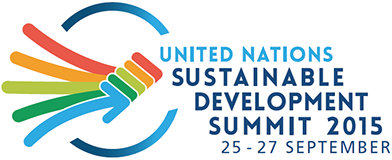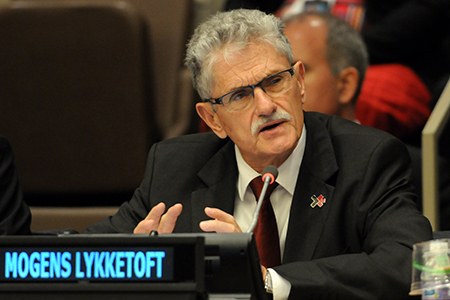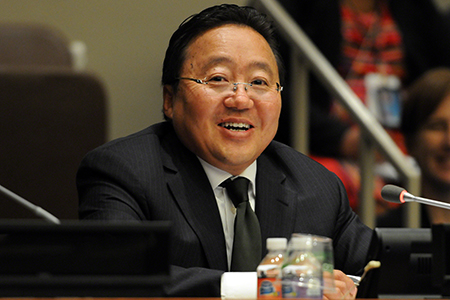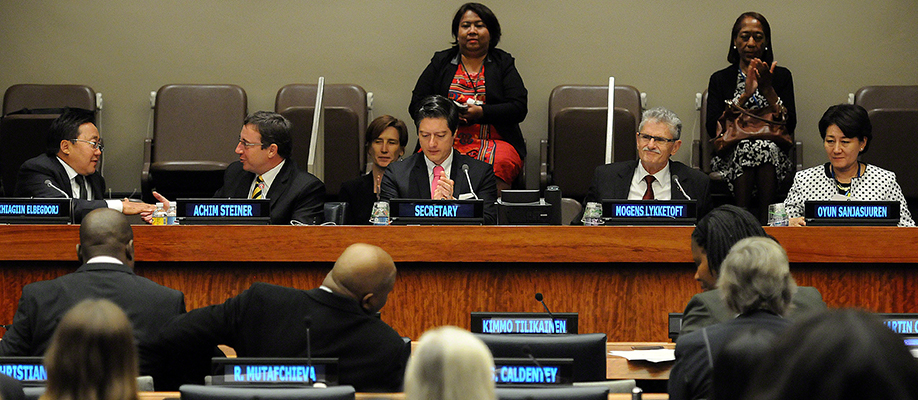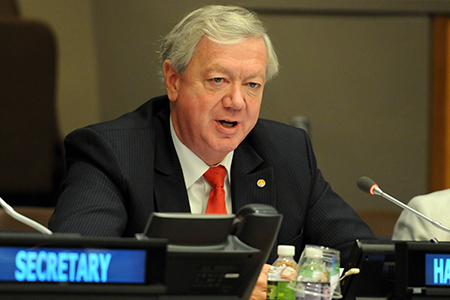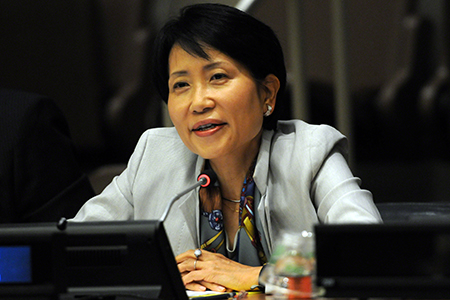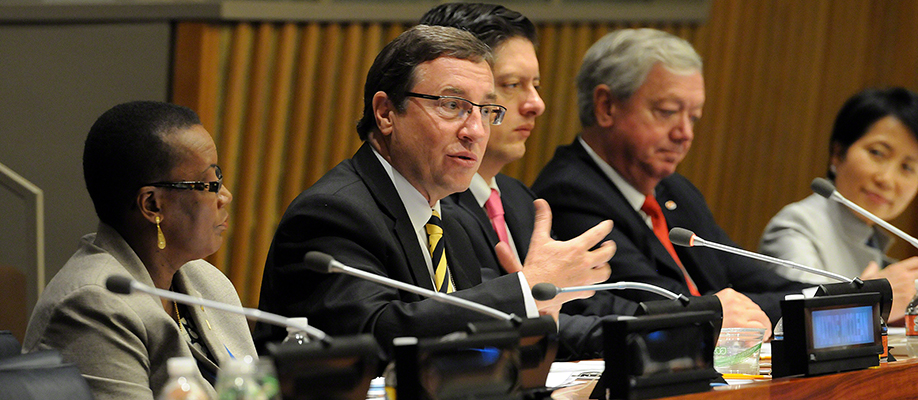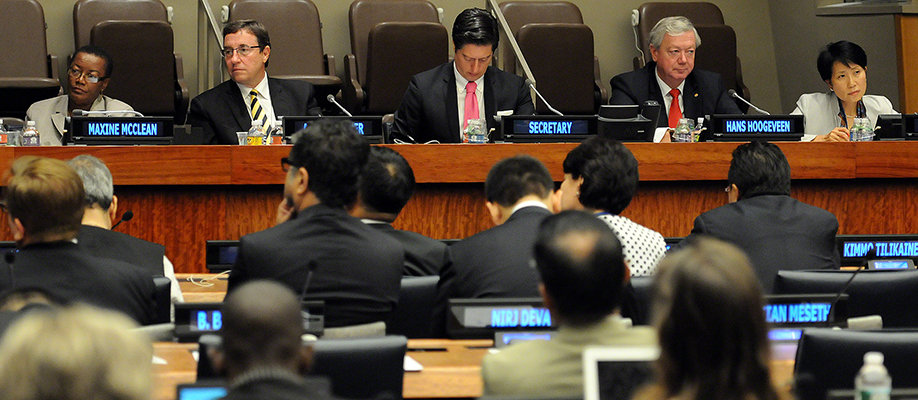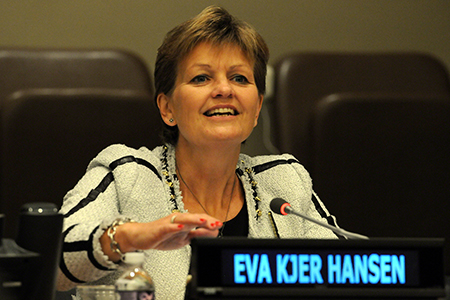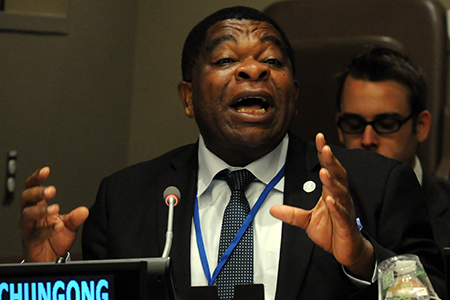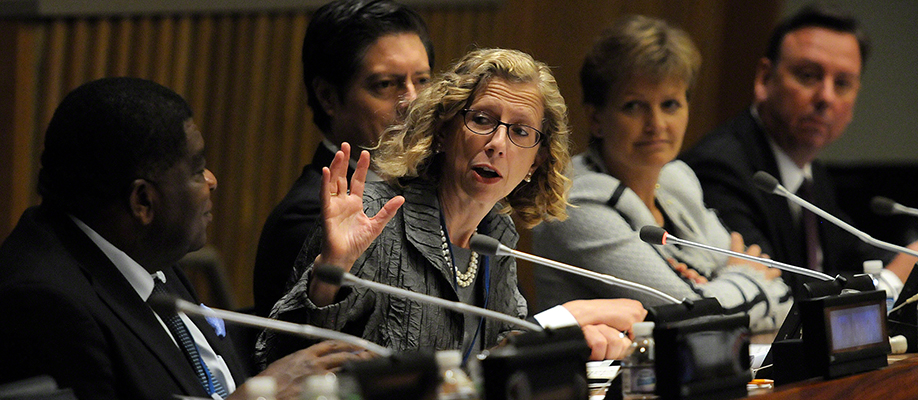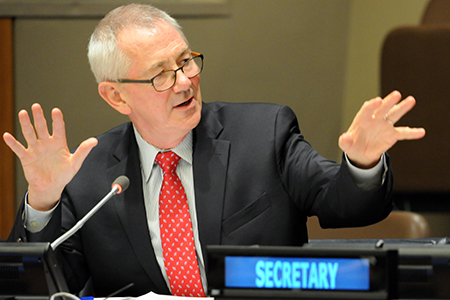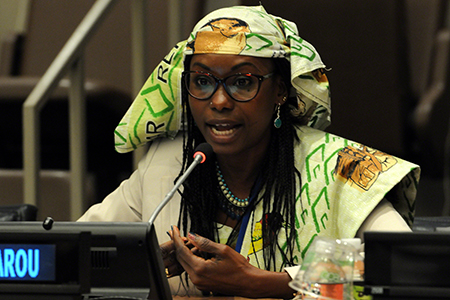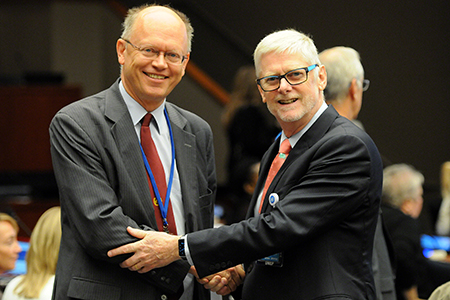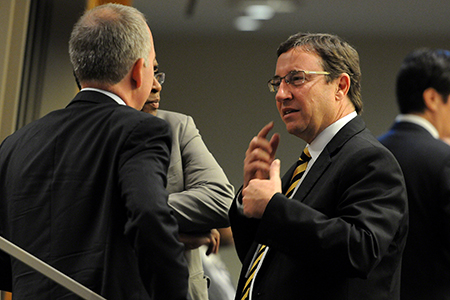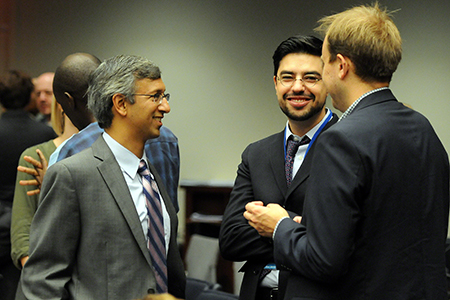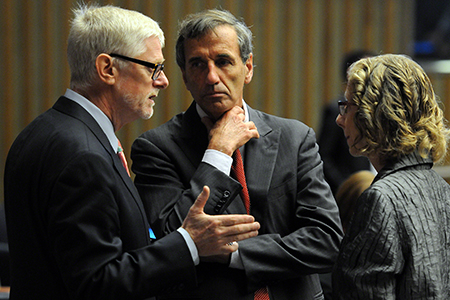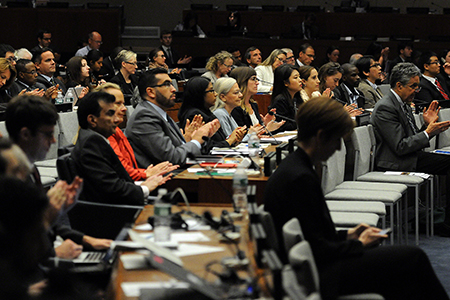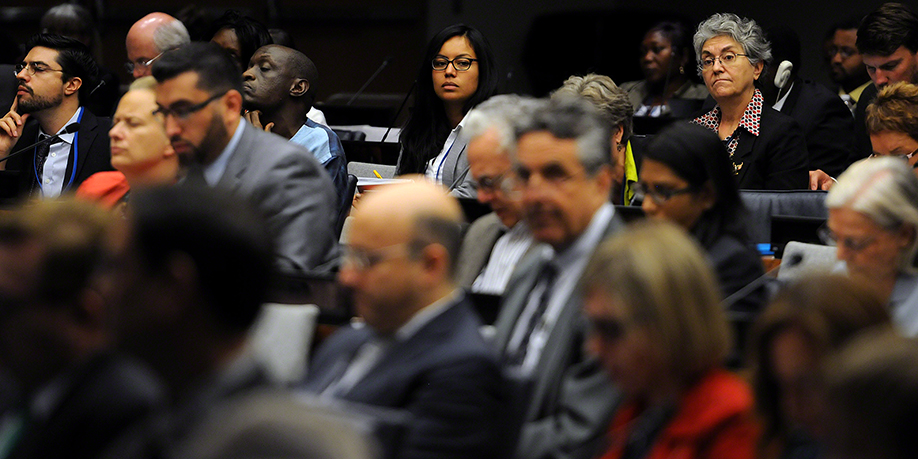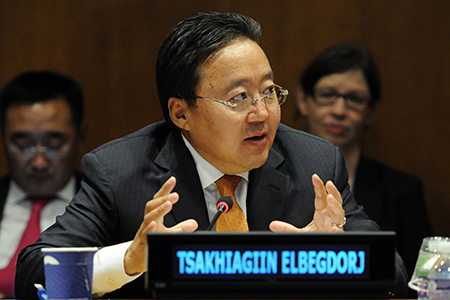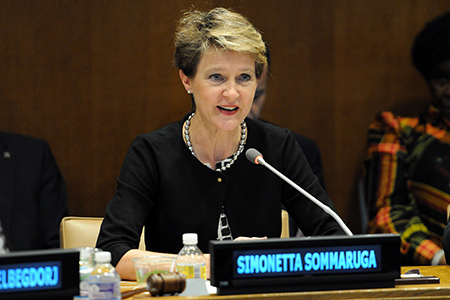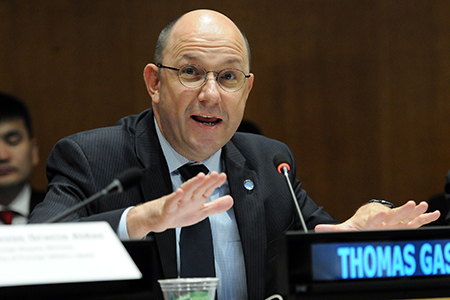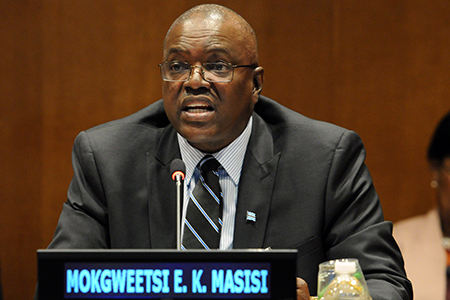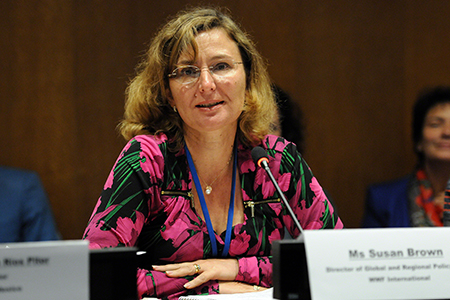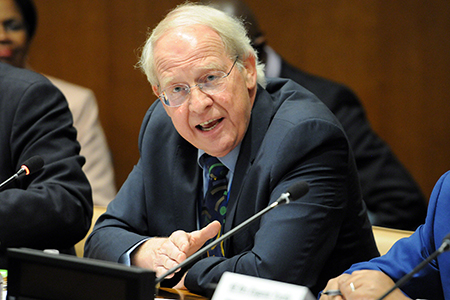Coverage of Selected Side Events for Saturday, 26 September 2015 at the United Nations Sustainable Development Summit 2015
26 September 2015 | UN Headquarters, New York
Receive ENBOTS Meeting Reports |
||
|
Receive our ENBOTS bulletins and reports by email: |
||

| Follow @IISDRS | ||

Loading... |
||
|
Receive emailed updates with the news articles above plus related information and announcements from our SDG community mailing list: |
||
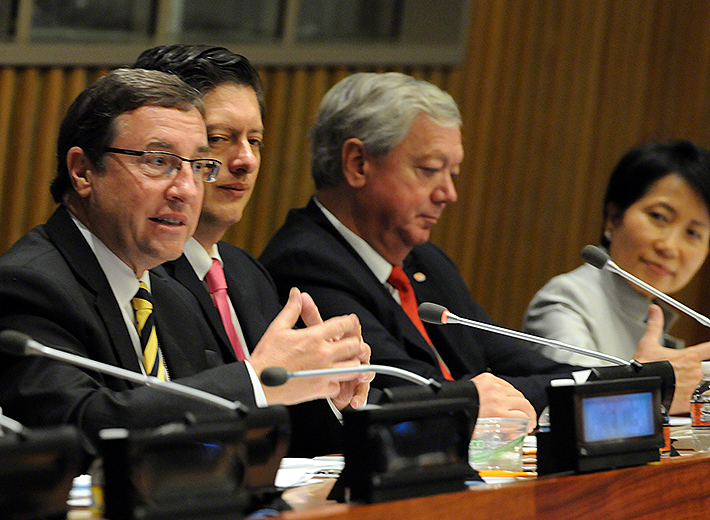
Achim Steiner, Executive Director of UNEP, speaking at the side event on A Call for Joint Action to Achieve the SDGs. |
||
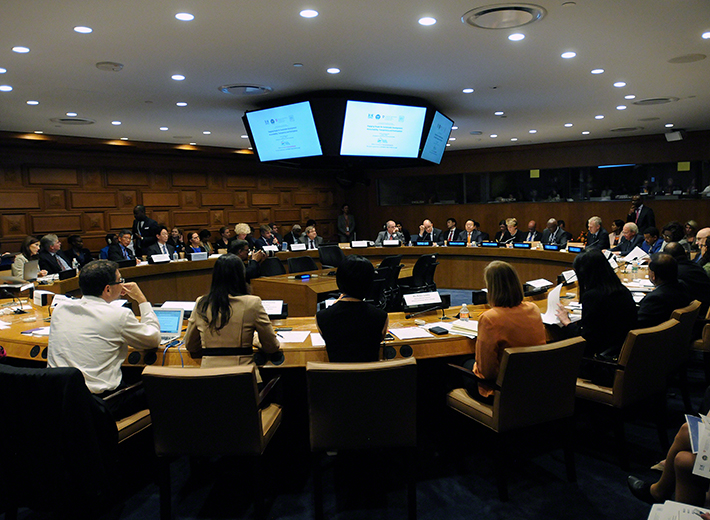
Audience during the side event on Engaging People for Sustainable Development. |
||
|
The following side events were covered by ENBOTS on Saturday, 26 September 2015: |
||
|
IISD Reporting Services, through its Earth Negotiations Bulletin on the Side (ENBOTS), will provide daily web coverage and summaries of selected side events from the United Nations Sustainable Development Summit 2015. | ||
| |||
|
The high-level side event on “A Call for Joint Action to Achieve the SDGs: Advancing Integrated Solutions to Accelerate Change” focused on the role of multi-stakeholder partnerships in implementing the 2030 Agenda for Sustainable Development. During the Opening Segment, Mogens Lykketoft, President of the UN General Assembly, noted the need for multi-stakeholder platforms to address the crosscutting and complex nature of the SDGs and to avoid the silos approach. He said the UN’s three pillars of peace, security and development are “as interconnected as sustainability and development.” Oyun Sanjaasuren, President of the UN Environment Assembly (UNEA) of UNEP, said the second meeting of UNEA will deliver on the environmental dimension of the 2030 Agenda, and indicated that the meeting will include a high-level ministerial review session focused on “healthy environment and healthy people,” which will complement the High Level Political Forum (HLPF). She announced the launch of the UNEA.org online platform, which is designed to facilitate multi-stakeholder engagement, and invited participants to attend the second meeting of UNEA from 23-27 May 2016, in Nairobi, Kenya. Tsakhiagiin Elbegdorj, President of Mongolia, stressed the need for a strong legally-binding agreement at the 21st session of the Conference of the Parties to the UN Framework Convention on Climate Change (UNFCCC COP 21). |
| ||||
| |||
|
|
| ||||
|
Opening a panel on “A life of dignity and prosperity for all: building economic frameworks and capacities for innovation, for promoting sustainable trade, consumption and production patterns and for green and inclusive growth,” Maxine McClean, Minister of Foreign Affairs and Foreign Trade, Barbados, said the pursuit of building a green economy is a high priority for Barbados, especially in the areas of energy, manufacturing and technology. Naoko Ishii, CEO and Chairperson of the Global Environment Facility (GEF), stressed the need for a multi-stakeholder approach throughout the global supply chain in order to build a coherent incentive system for addressing unsustainable consumption and production patterns. Hans Hoogeveen, Director General for Agriculture and Nature Management, the Netherlands Ministry of Economic Affairs, said food production will need to increase by 60% to feed 9 billion people, while one-third of the food produced every year, with one-fourth of the water used in agriculture, is being wasted. He noted that international initiatives, such as The Food Loss & Waste Protocol, will be necessary to achieve SDG target 12.3, which calls for halving per capita global food waste at the retail and consumer level by 2030. |
| ||||
|
|
|
Opening a panel on “Breaking the silos: effective, accountable and inclusive institutions at national and local levels for implementation of sustainable development,” Eva Kjer Hansen, Minister for the Environment and Food, Denmark, stressed the need for an integrated approach in implementing the SDGs. She called for reforming the way in which governance systems are being built at the national, regional and global levels, by breaking the silos and engaging all stakeholders at all levels. Martin Chungong, Secretary-General of the Inter-Parliamentary Union (IPU), said parliaments will provide oversight for the 2030 Agenda for Sustainable Development and help ensure the accountability of commitments and partnerships. Gino Van Begin, Secretary-General of the International Council for Local Environmental Initiatives (ICLEI), spoke about the role of local governments in implementing the SDGs and underlined the importance of multi-stakeholder engagement for unlocking the potential of urban transformation by 2030. |
| ||||
| ||||
|
|
|
Opening a panel on ”Mainstreaming biodiversity: restoring and sustaining healthy ecosystems for people and planet,” Yolanda Kakabadse, International WWF President, noted that the environment is the foundation of sustained and inclusive global development. She stressed the need to redefine how the global community tackles poverty, which she explained is the result of poor management of wealth, while “wealth is nature.” Andrew Steer, President and CEO of the World Resources Institute (WRI), underscored the need for: leadership by governments; ownership by nations; monitoring and focusing on the results; transparency and good governance; and partnerships. Hindou Oumarou, Sahel Region Representative at Indigenous Peoples of Africa Co-ordinating Committee (IPACC), said biodiversity is the health, market and identity of indigenous people, adding that “without our land, without our resources, we are nothing.” The outcome of the event will be a communiqué titled “A call for joint action to achieve the SDGs: advancing solutions and delivering support for transformative change,” which will be presented during the Summit. |
| ||||
|
||||
|
|
|
|
|
|
| |||
| |||
|
|
|
|
|
|
|
The high-level side event ‘Engaging People for Sustainable Development: Accountability, Transparency and Participation’ addressed existing mechanisms, roles of actors and enablers that could contribute to the transparent, participatory and accountable achievement of the 2030 Agenda for Sustainable Development. Simonetta Sommaruga, President of the Swiss Confederation, said that accountability is an essential element of deepening democracy and stressed the need for constant and open dialogue, where citizens have access to information from different and free sources. She discussed the importance of compromise, collaboration, leadership and trust, and warned against the dangers of corruption. Tsakhiagiin Elbegdorj, President of Mongolia, discussed the improvements in human rights, transparency and rule of law in Mongolia and noted the difficulties that come with being a resource rich country, with regard to corruption. Mokgweetsi Masisi, Vice President of the Republic of Botswana, said that the world will achieve the SDGs through participatory democracy and emphasized the importance of the active participation of vulnerable groups in implementation. Thomas Gass, UN Assistant Secretary-General for Policy Coordination and Inter-Agency Affairs, stressed that the SDGs are different than the Millennium Development Goals (MDGs) because of a pledge of accountability and because everyone must be engaged and nobody should be left behind. Carl Wright, Commonwealth Local Government Forum (CLGF), stressed the important role that local authorities will play in implementing the SDGs and described the many international outputs that highlight the role of local governments and democracy in achieving development goals. Yves Leterme, Secretary-General of International IDEA, noted that the follow-up should build on existing institutions and called for the sharing of best practice examples from the local level. He described five key concepts: decentralization; participation; skills or capacity; openness; and service delivery. Noting that “if there is no civil society – there is no accountability,” Maria Leissner, Secretary-General, Community of Democracy, stressed the importance of the freedom of the media and of addressing governments’ abuses of power. Matern von Marschall, Member of Bundestag Germany, underscored the role of education and called for members of parliaments to become actively engaged in the SDGs. David Yang, Deputy Assistant Administrator, USAID, Bureau for Democracy, Conflict and Humanitarian Assistance, highlighted some key points: the SDGs are different from the MDGs; the eradication of poverty is a centerpiece of the SDGs; civic liberty is very important; and there is a need to support technical and development assistance to achieve all the goals as they pertain to governance. Ximena Puente, Chief Commissioner, National Transparency and Access to Information Institute, Mexico, described how Mexico is taking steps to promote transparency, participation and access to information at all levels, and emphasized the importance of cooperation. Riika Laatu, Deputy Director General, Ministry of Foreign Affairs, Finland, stressed the need for integrating the sustainable development agenda into budgeting, policy coherence, and monitoring. Masami Tamura, Director of the Global Issues Division, Ministry of Foreign Affairs, Japan, emphasized the importance of a holistic approach to education. Susan Brown, Director of Global and Regional Policy Unit, WWF International, underscored the importance of civil society’s engagement in implementing the SDGs. She recommended evidence-based evaluation across the three dimensions of sustainable development. Abdul Mativ, President, Bangladesh Chamber of Commerce, stressed the need to support countries with large populations and limited resources like Bangladesh and noted that “one size fits all” approaches will not be successful. |
| ||||




